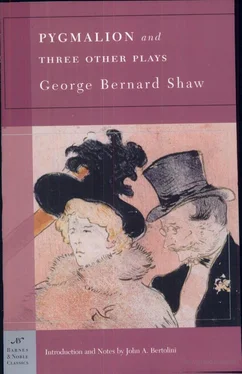HEARTBREAK HOUSE
The Doctor’s Dilemma and Pygmalion, for all their embedding in social problems — doctors having a pecuniary interest in their patients’ illnesses, language as class barrier — grew out of Shaw’s preoccupations with the figure of the artist, the dangers of self-absorption combined poisonously with lack of self-knowledge. Heartbreak House grew out of and during the four-year cataclysm World War I, the family feud among the ruling houses of Europe, which nearly ended them all, along with everyone else. To Shaw, who forged — and I mean forged — through an intense exercise of will and faith an optimism about the future course of the human race in the face of his own subcutaneous suspicions that human beings harbor within a fugitive desire for self-destruction, the war was a nightmare come true.
He first reacted, as writers tend to do, by writing something — a pamphlet he called “Common Sense About the War.” In it he argued that first of all, now that we (Great Britain and its allies) are in the war we must prosecute it vigorously to the finish, but we must seize the opportunity when it is over to insure that it is the last war. While conceding the necessity of victory, though, Shaw argued that we must not deal with the defeated Germans from a morally superior position. He also opined that if the Germans behaved badly to the civilian population in Belgium, we have behaved badly to subjects of our empires, that the Germans’ militarism differs little from ours. He challenged the rhetoric of the war by suggesting that if those who insist we must crush Germany totally mean it, then why do we not try to kill all the German women instead of the men?
Such equations and flippancy infuriated the reading populace and the literati, who mostly supported the war and Britain’s role in it. Shaw turned almost overnight from a tolerated, popular provocateur into a national persona non grata. He was denounced left and right, called the vilest names (fellow playwright and former friend Henry Arthur Jones, in an open letter, called Shaw “a freakish homunculus, germinated outside of lawful procreation”); Theodore Roosevelt vilified him. Shaw’s books were removed from bookstore shelves; people asserted they would get up and leave the room if Shaw entered; for a while it seemed he might suffer Oscar Wilde’s fate upon being imprisoned for sodomy, that of being deliberately ignored. To Shaw such attacks mattered little, for his courage and indifference to personal criticism was — well, extraordinary.
I know of no better example from Shaw’s life that illustrates this quality of extraordinariness in him than the episode of his expulsion from the Dramatists’ Club. At an October 27, 1915, meeting, there was a discussion among the members of their desire not to encounter Shaw at the Club, given his attitude toward the war. The Secretary, H. M. Paul, then wrote to Shaw that his company was undesired by some of the members. Did Shaw sue them? Did he whine to the newspapers that his freedom of speech was being suppressed? No, he wrote back to Paul that as the constitution of the Club made no provision for expelling members, here is how they must go about it: “The proper procedure is as follows. They must draw up a resolution that I be expelled from the Club, and state their reasons. Of this full notice must be given so that every member of the Club shall be warned that it is going to be moved.” Etc. Now, it takes a miraculous amount of good temper (or a miraculous absence of rancor) to write such a letter. Who among our public literary figures would be capable of such a gesture in such a political context?
For Shaw, a comic sense of things was not only indispensable, but a stay against despair. Yet he felt the wounds of the war through the grief of friends who lost loved ones in battle. When Mrs. Patrick Campbell’s son, Alan, was killed in 1917, Shaw wrote to her expressing his anger over the war: “These things simply make me furious. I want to swear. I do swear. Killed just because people are blasted fools.” At other times, Shaw was able to channel his anger into a kind of humor that can only be described as dangerous — and courageous.
When St. John Ervine, a fellow playwright and future biographer of Shaw, was wounded by a shell and had to have a leg amputated, Shaw wrote to cheer him up. First he recounted to Ervine how he, Shaw, had once broken a leg and had to get around on crutches but found that he could do without his “leg just as easily as without eyes in the back of my head.” Shaw then asserted that Ervine was actually better off than he himself was: “You will be in a stronger position. I had to feed and nurse the useless leg.You will have all the energy you hitherto spent on it to invest in the rest of your frame. For a man of your profession two legs are an extravagance.” Shaw went on to enumerate other benefits to losing the leg, such as an increased pension, and no more going to the Front. Finally Shaw reached the logical conclusion: “The more the case is gone into the more it appears that you are an exceptionally happy and fortunate man, relieved of a limb to which you owed none of your fame, and which indeed was the cause of your conscription” (Collected Letters, vol. 3, pp. 550 - 551 ). Wit does not usually seem a humane weapon, but such a letter shows the same kind of comic courage Aristophanes exhibited when he condemned war by imagining women on a sex strike.
Heartbreak House was written in a context where one could consider writing such a letter, and the play’s mixed tones show it. Shaw claimed that the play wrote itself. By turns whimsical, farcical, melancholy, tragi-comic, and visionary, Heartbreak House sometimes drifts and sometimes sails full speed ahead — whith — ersoever. Shaw said that it represented the European elite before the war — by which he meant the people whose concerns should have been history, political economy, and government, but were instead sex, aesthetics, leisure activities, and money, and so people who let their countries blunder into war. Shaw arranges for various representative members of this society to gather for a weekend in the country in ancient Captain Shotover’s house, which is designed to resemble a ship and therefore carries the metaphoric suggestion that it is the Ship of State. (People have been misled by Shaw’s subtitle, “A Fantasia in the Russian Manner on English Themes,” to see a strong resemblance to Chekhov’s plays, but Heartbreak House is at least equally indebted to Tolstoy’s The Fruits of Enlightenment or Gorky’s The Lower Depths.)
Shaw claimed repeatedly that he did not know what his play meant, and indeed it is full of mystery. The play is launched with a young woman falling asleep while reading Othello, so that the rest of the play seems to be her dream, a bed-voyage. It begins and ends respectively with the averting of a small and a large destruction. In between, identities become confused and fluid as in dreams. The Captain insists on mistaking Mazzini Dunn for his old boatswain, Billy Dunn, though they do not look alike, and when the real Billy shows up unexpectedly, Shotover asks him, “Are there two of you?” — and gets one of the play’s biggest laughs (in a play that has fewer laughs than almost any other of Shaw’s plays). Billy explains to his Captain the confusion by noting that there were two branches of the Dunn family, the drinking Dunns and the thinking Dunns.
Captain Shotover as an inventor, adventurer, and architect succeeds Ridgeon and Higgins as a figure for the artist, but an artist who has gone slightly mad from disappointment with reality, whose heart was broken when his daughter rejected his ways and left home, and who himself has taken refuge in rum. To fill the void made by his daughter’s desertion, he enters into a spiritual marriage with young Ellie Dunn, who had been in actuality planning herself to marry an older man, the crude capitalist Alfred Mangan. In that way, Shotover continues in the Shavian/Shakespearean line of spiritual affinities between fathers and daughters. In Major Barbara, Cusins says to Undershaft: “A father’s love for a grown-up daughter is the most dangerous of all infatuations. I apologize for mentioning my own pale, coy, mistrustful fancy in the same breath with it” (p. 98). Like Undershaft, too, Shotover invents and keeps explosives.
Читать дальше












